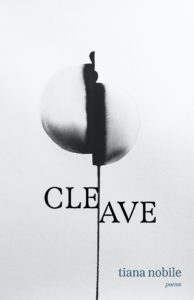 Review by Michele Sharpe
Review by Michele Sharpe
Cleave is a poetry collection of magnitude and fascination, spanning continents, history, and personal obsessions. I started reading it one evening after dinner and stayed up late with it, still reading. As poet Gabrielle Calvocoressi notes on the publisher’s page, “With breathtaking lyric beauty and formidable formal range, Nobile details the intimate effects of the international adoption industrial complex on children and parents caught up in a system’s unrelenting hunger. This is a book of remarkable compassion and real horror. Its stories will be news to many and all too familiar to others.”
Most, perhaps all, people who are adopted by strangers have experienced feelings of loss and alienation and an absence of knowledge about their origins. I’m a domestic adoptee, and Tiana Nobile identifies as a Korean American adoptee, so there are important distinctions in our two experiences of adoption, but her stories are still “all too familiar” to me. In a series of poems titled “Abstract” that are spaced out in the collection Nobile works with the abstraction that looms in absence. All these poems begin with wide, white space, visually illustrating the blank page that many of us face.
Mother without a face
looks in the mirror. I wonder what creases we share. I wonder
how long her hair is. I wonder if she chews on the inside of her mouth
until the skin is chafed pulp . . . (10)
Adoption is often portrayed as a private family matter, but it’s a cultural practice, and it doesn’t exist in a vacuum. The adoptee experience of loss and alienation can be exacerbated in transnational and transracial adoptions in a country like the U.S., where racism and anti-immigrant hate poison communities, families, and individuals. Tiana Nobile’s poems place her personal experience of adoption in that wider community and in a historical continuum of American imperialism in Asian countries, making this a critical book for our critical times.
It’s also an aesthetically rich book, full of sensory delight in language and provocative use of many traditional elements of poetry like internal rhyme, organic form, alliteration, and startling imagery, much of which is taken from the “monkey love” science experiments of the 1960’s that separated newborn monkeys from their mothers in a study of maternal deprivation. From “Mother of Wire” (43)
Call me Rhesus
Young and Moonless
monkey without a cloth
to dust her bones
A variety of intriguing formats in addition to the “Abstract” poems are included in the collection. For example, in “Where Are You Really From?” Nobile employs a justified prose poem format. A list of place names in the U.S. create a mystery narrative — one that illuminates the empty past of people separated from mother, family, culture, language, and history
Intercourse, Pennsylvania. Fertile, Iowa. Uncertain, Texas. Hazard, Nebraska. Accident, Maryland. Why, Arizona. Hell, Michigan. Disappointment, Kentucky. Embarrass, Minnesota. Truth or Consequences, New Mexico. Nameless, Tennessee. No Name, Colorado. Nada, Texas. Nothing, Arizona. (9)
Many of the poems mine science (or pseudo-science) for information on the mother-infant bond and details about fetal and infant Nobile’s poem, “Lost First Languages Leave Permanent Mark on The Brain, New Study Reveals,” uses this headline format to introduce a final meditation on what is lost
How do I translate
the sound of my mother’s
moaning? It’s a soft wail
I hang on the wall
of my windpipe (44)
Cleave by Tiana Nobile
Hub City Press, 2021
Softcover – $16.00
(ISBN: 978-1-938235-75-7)
Michele Sharpe, a poet and essayist, is also a high school dropout, hepatitis C survivor, adoptee, and former trial attorney. Her essays appear in venues including The New York Times, The Washington Post, and Poets & Writers. Poems are recently published or forthcoming in Sweet, Mom Egg Review, Rogue Agent, and Salamander. She lives in North Florida.
